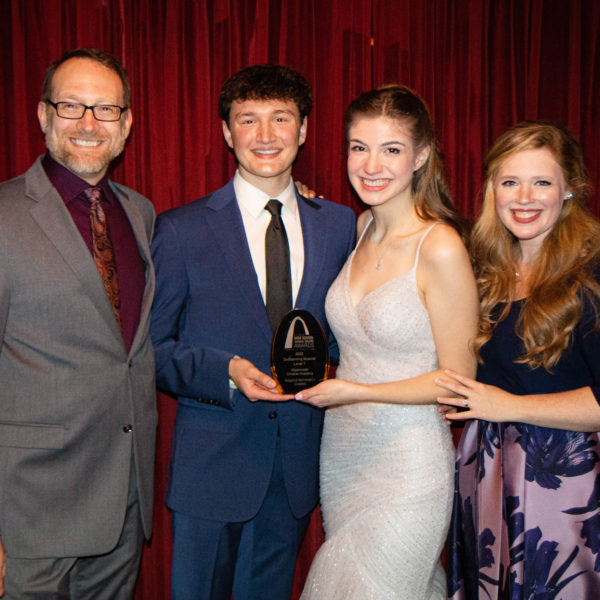Where Does Our Worth Come From?
From the Ranked, A Musical Playbill
by Jim Butz, Upper School Drama Teacher and Director of Ranked
One of the most challenging parts of any theatre educator’s job is to find good material to work on with their students. There are always issues of cast size, content, and overall artistic merit to consider. Finding a good piece can feel like searching for a needle in a haystack. A few years back, while sifting through one such haystack, I came across an obscure new musical called Ranked.
The story takes place in a high school, the characters are all teenagers, and the music is more akin to what our students listen to through their AirPods than anything written by Rodgers and Hammerstein. Given the show’s obscurity, contemporary score, and controversial subject matter, the entire endeavor felt a little risky. I wasn’t quite sure how to stage the piece, and I was even more unsure of how our audience would receive it. But now, with the production safely in the rearview mirror, all I can say is I am glad that our department took the risk. It was difficult but, ultimately, extremely rewarding.
The musical, Ranked, is a play with a mission, a message, and an implicit moral. Whether the writers intended it or not, they are using the context of an overly competitive high school as a heuristic for a more comprehensive existential quandary: Do human beings have intrinsic and immutable worth, or are we relegated to a sliding scale of value based on our assets and achievements? Does there exist an actual economy of grace that transcends the power structures erected by man? Let’s make it plain and personal: Where do you derive your value?
In the world of Ranked, a student’s value is precarious, never secure, and always conditional on their academic achievement. To make matters worse, the students are subjected to a culture of public shame and pride as their ever-vacillating place—or rank—is on display for all to see. This public display is a constant visual reminder of the two worlds within the culture of Ranked: students above the average and those below. If you are above, your future is bright and full of hope, and your identity is provisionally secure. If you are below the average, you might as well give up and get used to your diminished identity as a second-class citizen with a bleak future ahead of you.
Thrust into this dog-eat-dog world is the protagonist, Lily Larsen. Lily is a freshman, and like most teenagers, she’s just trying to figure out who she is, where she belongs, and perhaps most importantly, what she’s worth. Power, status, and academic achievement are the only metrics by which human worth is measured. There is a wholesale absence of intrinsic human dignity. Throughout the show, this cautionary tale reveals the consequences of living within such a relentlessly competitive culture and the perverse motives and ethics it engenders.
Our children are navigating a complex and often overwhelming world with increasing demands, ubiquitous access to social media, sleep deprivation, lack of meaningful connection to people and nature, fear of an uncertain future, and a constant barrage of bad news from all over the globe buttressing those fears. While not every teenager struggles with mental health issues, there has been a sharp increase in the rates of depression and anxiety in the teenage population over the past decade. It is a tough time to be a kid trying to figure out who you are, why you matter, and where to find hope amid the chaos.
Does the world of Ranked describe or hold a mirror to our community here at WCA? No, not entirely, and not even mostly. We did not choose this musical as a covert critique of the culture of Westminster. However, I still think we would do well to heed the message that Ranked is attempting to communicate. We are not immune from falling into a worldly system built upon a soul-crushing performance treadmill, ever-increasing speed and incline. The presence of the Gospel here at Westminster is the only antidote for that wicked scheme. Our worth is not performance or merit-based. We affirm all human beings are fearfully and wonderfully made in the Image of God, and it is upon that basis that we assign an inestimable worth to every person.
We live in an economy of grace and not of merit. Jesus gives us our identity, and we don’t earn a thing but are given everything out of the abundance of his love for us. That is the truth and scandal of the Gospel. It is important that we know this to be the truth about who we are. It is equally important that we act out of what we know to be true. Those are not the same thing. There is always the risk that we affirm one thing with our mouths but then encourage an entirely different culture with our lives. The power of a musical like Ranked is that it can shine some light on that dark temptation within us and lead us back to a determination to create a culture more reflective of the Kingdom to which we have sworn allegiance.
This article was originally published in our alumni magazine, Chimes. Read more from the Spring 2023 issue.




